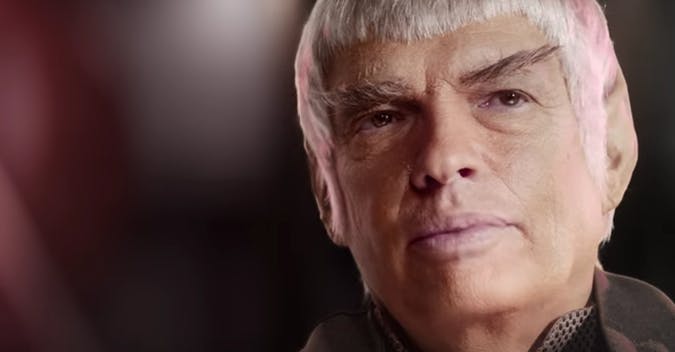Fans who’ve been nervously watching the copyright battle between Paramount Pictures and CBS Studios and the creators of a Star Trek fan film may soon get the resolution they’ve been hoping for.
The crowdfunded film Star Trek Axanar, a follow up to the successful short film Prelude to Axanar, was supposed to tell a fan-created story set during the Four Years War focusing on Garth of Izar, an obscure character seen only once in The Original Series episode “Whom Gods Destroy.”
But in December, Paramount Pictures Corporation and CBS Studios, Inc. hit the film with a lawsuit claiming copyright infringement. The lawsuit left Axanar‘s future hanging in the balance and raised questions about the potential impact for future high-production-value fan films.
The fight also drew the attention of Star Trek Beyond director Justin Lin. Lin tweeted his support for the fan film earlier this year and, according to J.J. Abrams, Lin even went to the studio to push them to drop the lawsuit. Abrams revealed this news at a fan event Friday, as he reassured fans that the lawsuit would be dropped in the next few weeks.
This is getting ridiculous! I support the fans. Trek belongs to all of us.https://t.co/mYMqIDXqHu
— Justin Lin (@justinlin) March 14, 2016
The reveal prompted the Axanar team to release the following statement:
“While we’re grateful to receive the public support of JJ Abrams and Justin Lin, as the lawsuit remains pending, we want to make sure we go through all the proper steps to make sure all matters are settled with CBS and Paramount. Our goal from the beginning of this legal matter has been to address the concerns of the plaintiffs in a way that still allows us to tell the story of Axanar and meets the expectations of the over 10,000 fans who financially supported our project.
“There is still a lot of work to do, but receiving this kind of public support helps immensely.”
According to BuzzFeed’s Adam Vary, Paramount sent him a statement and confirmed the company is working on a settlement as well as guidelines for fan films.
https://twitter.com/adambvary/status/733899859917307905
In a blog post on the Axanar website Sunday, producer Alec Peters wrote that the lawyers on both sides still have work to do “before the lawsuit is officially resolved” and once guidelines are released they will “make sure we have a clear idea of what needs to be done to meet those expectations” before deciding how to move forward with their film.
The legal troubles began in December when Paramount Pictures and CBS Studios sued Axanar Productions for “unauthorized exploitation of Star Trek” following the film’s wildly successful crowdfunding campaign.
The lawsuit concerned Star Trek Axanar as well as the short film Prelude to Axanar, which is already available for viewing. The suit claimed that both films “infringe Plantiffs’ works by using innumerable copyrighted elements of Star Trek, including its settings, characters, species, and themes.” The lawsuit pointed out that more than $1 million was raised in the crowdfunding campaign—an amount that allowed the film’s producers to “[build] out a studio and [hire] actors, set designers, and costume designers.” Paramount and CBS sought damages in the suit.
Loeb & Loeb, the firm representing CBS and Paramount in the case, did not return the Daily Dot’s requests for an interview.
To fight the suit, Axanar signed with the law firm Winston & Strawn, which filed a response on Feb. 22. The defense argued that the lawsuit failed to specify exactly how the Axanar works infringe on copyright, and that any complaints against the longer film were premature, since it has not been made yet and the film’s script was reportedly not final. CBS and Paramount then snapped back in March, filing an amended lawsuit.
Winston & Strawn filed a motion to dismiss or strike parts of the amended lawsuit. One of the points addressed the claim by CBS and Paramount that the Klingon language is a copyrighted work. The motion states it “is not copyrightable”—a claim that’s received particular attention since it surfaced in the suit. The non-profit Language Creation Society filed an amicus brief in April that made the case that “the language has taken on a life of its own.” The brief used the Klingon language throughout, with the English translation in the footnotes. It concluded that the language has “a life that the Copyright Act has no power to control” and, like other spoken languages, cannot be copyrighted. This prompted reactions from all sides.
On May 9 the court denied the society’s brief with the LCS stating it “will continue to monitor the case” and “if the language issue remains when the case goes to summary judgment, we expect to re-file a refined amicus brief.” The following day on May 10 district judge Robert Gary Klausner rejected the Axanar motion to dismiss. In eight pages, Klausner explained the decision, concluding that “although the Court declines to address whether Plantiffs’ Claims will prosper at this time, the Court does find Plantiffs’ claims will live long enough to survive Defendants’ Motion to Dismiss.” According to the Axanar blog, a trial date is set for Jan. 31, 2017. Though statements by Abrams suggest the suit won’t make it that far, Axanar still had to file its response to the amended lawsuit and did so Monday.
“This filing was necessary because, despite J.J. Abrams’ assurance that the lawsuit would be ‘going away,’ and confirmation that CBS is in settlement talks and finally working on fan film guidelines, Paramount and CBS have not yet dismissed the lawsuit,” Axanar’s PR director Mike Bawden wrote Tuesday. “Axanar Productions must therefore meet deadlines set by the court and proceed as if the lawsuit will continue until the situation is resolved.”
Axanar’s most recent legal response highlights the supportive remarks made by Abrams and Lin and offers a look at how the films qualify as fair use. It also includes a “Counterclaim for Declaratory Relief” asking reimbursement for attorneys’ fees and costs. It concludes with a demand for a jury trial.
At issue in the case is the question of whether the fan film qualifies as a “derivative” work or a “fair use” of the original copyrighted work. The vast majority of fanworks exist under the fair use clause, in large part because fans are able to argue that they “transform” the original work rather than merely reproduce it. It’s when the copyright holder feels the fan work is purely derivative—essentially a copy of the original—that things get complicated.
Axanar’s attempts to achieve the aesthetic of the real Star Trek seem to have actually made it more derivative in the eyes of Paramount and CBS. According to the initial suit filing: “The Axanar Works are intended to be professional quality productions that, by Defendants’ own admission, unabashedly take Paramount’s and CBS’s intellectual property and aim to ‘look and feel like a true Star Trek movie.’”
The Daily Dot asked intellectual property attorney Dale Cendali, a partner at Kirkland & Ellis LLP, in March for an independent view of the original complaint and first response. Cendali also noted that Axanar’s high quality works against it. “Classically, fan activity is noncommercial, not for profit, fun interaction on the Internet, and this type of effort with what I understand to have raised over a million dollars from Kickstarter would have earmarks of looking much more like an elaborate derivative work that could compete with the authorized copyrighted material.
“It looks like what they’re concerned about is that someone is taking the world of Star Trek and financing what seems to be a very professional-looking film when the owners of the copyright of Star Trek are obviously doing the same thing,” she said.
Erin Ranahan, a partner of Winston & Strawn’s Los Angeles and San Francisco offices, is working with associate lawyers Andrew Jick and Kelly Oki on the case for Axanar. She told the Daily Dot in February that the case appealed to the firm both because of its high profile nature and its importance as a case examining fair use under U.S. copyright law. The firm also decided to take on the case pro bono, since “this is obviously an organization that doesn’t have much money or backing so they were either going to get steamrolled or they were going to get some help.”
Ranahan has not worked on a case involving a fan film before, but she has worked many copyright infringement cases. However, she views this one as unique. “There haven’t been many cases in this arena because for the most part companies have allowed fans to create, recognizing that it’s free publicity and it’s not competing directly against them,” she said. “Either companies have allowed it, or once a company has expressed a concern, the fans honor that and abide because they’re fans of the universe or area so they’re not trying to step on anyone’s toes.”
Companies have expressed issues with fan films in the past, sent cease and desist letters, and caused the suspension of fan films raising lots of money on Kickstarter. Other companies like Lucasfilm, which has been involved in its share of lawsuits and previously expressed its concern with fanworks, have developed more relaxed stances over the years. “Star Wars, for example, their fans just make all sorts of fan films,” Ranahan noted. Lucasfilm even hands out awards to Star Wars fan films submitted to its official contest. Though it appears nothing similar has been done for Star Trek fan films officially by CBS and Paramount, if guidelines for fan films are released it will be a big step forward.
Ranahan pointed out that the franchise has allowed and tolerated fan films in the past, along with reams of Star Trek fanfiction. Axanar insists that its films are in line with other, similar not-for-profit fan films and fanworks:
Peters told The Wrap in August that the team actually met with CBS, and that while the company didn’t offer any specific guidelines for the project, CBS made it clear the fans just couldn’t profit from it. The response to the amended complaint also points to Peters’ contact with CBS and that this was what he understood from it.
Ranahan doesn’t think the lawsuit will prompt a sudden attempt by corporations to go after other fanworks, or that this case will extend outside the Axanar works. She believes Paramount and CBS recognize the value of non-commercial fanworks in keeping the franchise popular and the universe alive—but clearly, something about Axanar was enough to prompt the lawsuit.
“This is unique in that our client wasn’t even given a letter like, ‘You know, we have concerns about this,’” she said. “It was just a lawsuit. So I don’t think that that’s typical. There’s obviously something that CBS and Paramount were concerned about here that they have never been concerned about before.”
Because Prelude to Axanar has already been produced, the question of infringement involves its use of familiar elements and characters from the franchise alongside its original content. In the response to the amended complaint, Axanar’s team state that the “Defendants deny that Prelude to Axanar is or was intended to be a derivative work, or that it infringes Plantiffs’ works,” but “admit that Prelude to Axanar was inspired by Star Trek, and tells a story about Garth of Izar that has not been told before.”
According to Cendali, while it’s not the same as the original work, the Axanar films might qualify as derivative works because they’re recognizable as “all being part of that world, that creative world with those creative characters and those creative characteristics.”
The feature film, on the other hand, hasn’t been made yet. Despite the original lawsuit’s claim that the script was created, Ranahan told the Daily Dot that several different scripts had been written for the film, so it could be adjusted in order to meet the lawsuit’s concerns.
“If we can find a way to make the film in a way that makes everybody comfortable … including Axanar and CBS and Paramount, that’s absolutely our goal,” she said.
It’s not clear, however, what Axanar might have to change or remove to satisfy Paramount and CBS, especially considering Axanar’s exacting efforts to recreate the aesthetic of the Star Trek’s characters, settings, and more.
But Ranahan believes it’s that very level of dedication that makes the film a niche property. “When you think about it, the viewers that are going to watch these fan projects are not going to not go see the official releases as well,” she said. “The idea that it’s going to impact the market is not likely going to be supported. I think we have strong arguments of fair use.”
Ranahan thinks it’s strange for the companies to be “suing their biggest fans:”
“These are hard, hardcore Star Trek fans. They’re trying to just celebrate [it] and they’re not trying to work against them and they’re not trying to take away their business or their viewers. Really they’re just trying to add on so it’s really interesting that they’ve been targeted like this and I don’t think that it will be typical. I don’t think there will be a whole new wave of fan films getting shut down.”
However, Cendali suspects CBS and Paramount don’t see Axanar as a typical fan film, since normal fan activity doesn’t tend to mean producing a million-dollar movie with a full production team and paid employees.
“[Axanar] started to take on much more of a highly commercial enterprise than what would normally be thought of as fan activity,” she said.
At the time, Cendali said a settlement might still be possible, provided it was acceptable to both parties—and attempts to edit the film might help. The Axanar blog post by Peters on May 10 indeed confirmed that they were trying to reach a settlement so Axanar “can move forward with telling the story of Axanar in a way that satisfies both the studios and the over ten thousand fans who financially supported our project.”
Until the lawsuit is officially settled, fans even beyond the Star Trek fandom will no doubt continue to watch to see the conclusion of the saga and how it might impact fan projects in the future.




